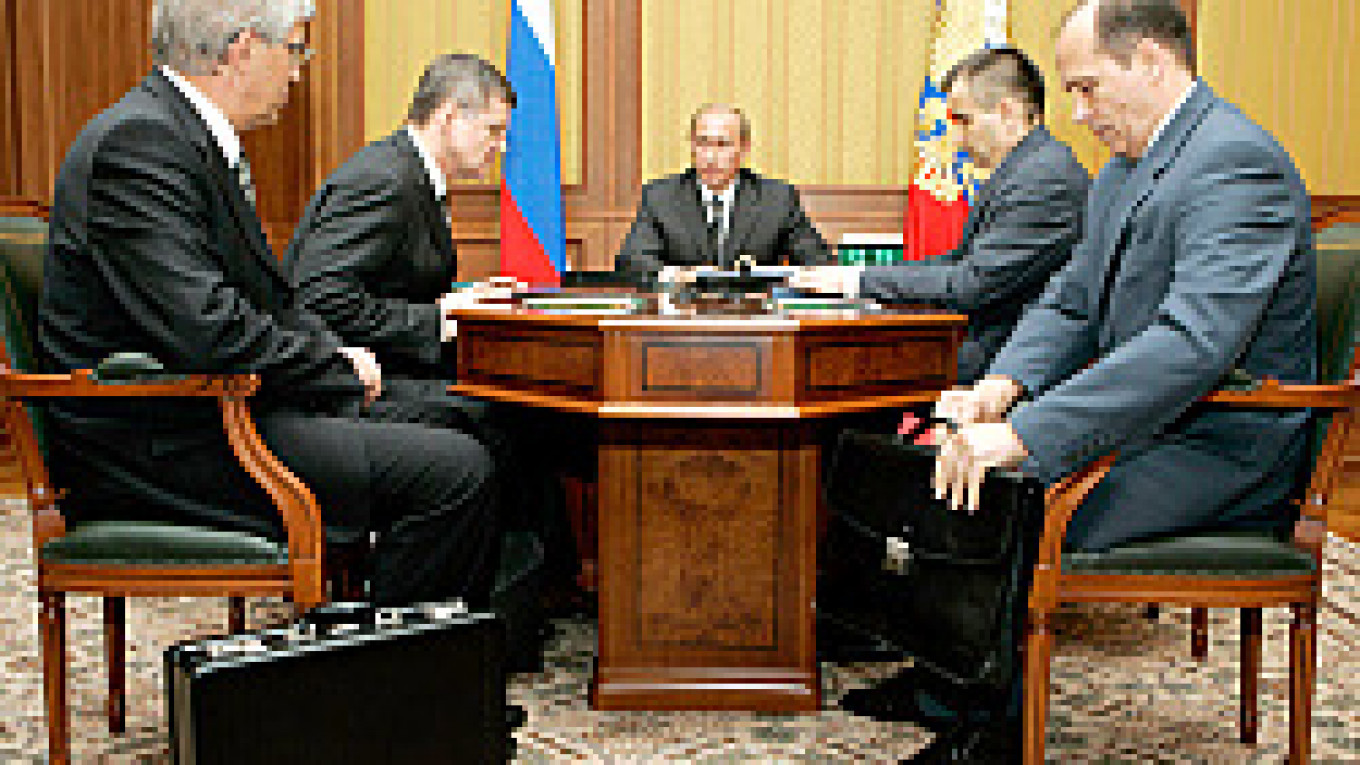Medvedev announced the replacement of FSB director Nikolai Patrushev with Alexander Bortnikov, head of the FSB's economic security division, during a session of the presidential Security Council on Monday. He said the council would be headed by Patrushev.
The appointments indicate that Prime Minister Vladimir Putin has chosen not to try to tilt the government's balance of power by seizing control of the law enforcement agencies, which have long reported to the president rather than the prime minister.
Bortnikov ?€” like Patrushev, Putin and Medvedev ?€” comes from St. Petersburg but is believed to be closer to Medvedev than the Kremlin's siloviki clan, which includes Patrushev and Putin's longtime deputy chief of staff, Igor Sechin. As part of a larger reshuffle Monday, Putin appointed Sechin as deputy prime minister in charge of industrial policy and energy.
"He is Medvedev's man, not Sechin's," Andrei Soldatov, an analyst who tracks the security services, said of Bortnikov. "The reshuffle suggests that a plan to redivide control over law enforcement agencies has been shelved."
Soldatov said the appointment was a setback for Putin's ally and former top drug enforcement officer Viktor Cherkesov, who had lobbied the Kremlin for the FSB post but instead got a position in an arms-procurement agency.
Some Russian media have speculated, however, that Bortnikov is close to Sechin.
Patrushev's appointment to the Security Council, however, indicates that its influence will grow, Soldatov said.
"We should expect the Security Council's functions to expand, because it will become a more serious grouping that will not only advise, but also influence the situation," said Sergei Goncharov, a former KGB officer and Moscow City Duma deputy.
The council is headed by the president but effectively run by its secretary. Its role and influence has varied, depending on the political weight of its secretary.
As for FSB, it can be expected to focus more on corruption and economic crimes, Bortnikov's areas of expertise, Goncharov said.
Soldatov said, however, that it would probably be business as usual for the FSB because it has already achieved its desired role ?€” to serve as a decision-maker on economic policy issues.
Bortnikov, a native of Perm, graduated from the Leningrad Institute of Railroad Engineers in 1973 before joining the KGB in 1975. He steadily rose through the KGB's ranks to become head of FSB's St. Petersburg division in 2003. He was appointed chief of the FSB's economic security department in 2004, taking a post vacated by Yury Zaostrovtsev, who resigned amid media reports that his father had run a security company that rendered services to Tri Kita owners and managers. The managers were accused of smuggling furniture.
Interfax reported that Bortnikov also held the rank of FSB deputy director. The FSB's web site, however, does not list Bortnikov among the six deputy directors.
Soldatov interpreted the absence as a sign that Bortnikov is a Medvedev loyalist who may not have been Patrushev's choice as a replacement.
Goncharov said, however, that he believed Bortnikov was "a figure who suits everyone," including Medvedev, Putin and Patrushev.
A Message from The Moscow Times:
Dear readers,
We are facing unprecedented challenges. Russia's Prosecutor General's Office has designated The Moscow Times as an "undesirable" organization, criminalizing our work and putting our staff at risk of prosecution. This follows our earlier unjust labeling as a "foreign agent."
These actions are direct attempts to silence independent journalism in Russia. The authorities claim our work "discredits the decisions of the Russian leadership." We see things differently: we strive to provide accurate, unbiased reporting on Russia.
We, the journalists of The Moscow Times, refuse to be silenced. But to continue our work, we need your help.
Your support, no matter how small, makes a world of difference. If you can, please support us monthly starting from just $2. It's quick to set up, and every contribution makes a significant impact.
By supporting The Moscow Times, you're defending open, independent journalism in the face of repression. Thank you for standing with us.
Remind me later.


